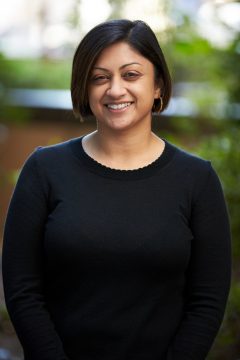Prachee Avasthi, PhD, an associate professor of biochemistry and cell biology at Dartmouth’s Geisel School of Medicine and one of the medical school’s newest faculty members, has received the 2020 Women in Cell Biology Junior Award for Excellence in Research from the American Society for Cell Biology (ASCB).
The prestigious award is given each year “to a woman in an early stage of her career who is making exceptional scientific contributions to cell biology, is developing a strong independent research program, and exhibits the potential for continuing at a high level of scientific endeavor and leadership.”
Established in 1961, the ASCB is an inclusive, international community of biologists studying the cell as the fundamental unit of life. Now with more than 9,000 members worldwide, the organization is dedicated to advancing scientific discovery, advocating sound research policies, improving education, promoting professional development, and increasing diversity in the scientific workforce. More than 30 past or current ASCB members have won Nobel Prizes in medicine or chemistry.

“I was excited to hear that I’d been chosen for this year’s award and that my name would be added to such an outstanding list of past awardees. Every year, I notice who wins this award and it’s always someone who I really respect, and think is doing beautiful science,” says Avasthi, who will receive the award and give an award lecture at the Cell Bio Virtual 2020 annual meeting in December.
“I’m also very happy for my lab,” she says. “It’s really the hard work of all of the lab members that contributed to this, so I’m delighted to be able to share this recognition with them—they deserve it.” The Avasthi Lab studies how complex cytoskeletal components are built and regulated within cells, using Chlamydomonas (green algae) as a model system to discover new biology shared with human cells to improve human disease.
During the highly competitive selection process, the Women in Cell Biology (WICB) Awards Committee found Avasthi’s early-career accomplishments to be “exceptional,” both as a researcher and a leader.
“Dr. Avasthi literally has created a new area in cell biology through her discovery and pursuit of actin’s role in flagella/cilia assembly in Chlamydomonas,” explains Mary Munson, PhD, who chairs the ASCB’s WICB Committee. “She is also well known as the founder of @NewPI_Slack, an amazing group that provides support, mentorship, networking, and career development for more than 2,000 members worldwide, dozens of whom signed one of the nomination letters—I think this was a first for WICB.”
“I was especially impressed to see that Prachee has received this distinguished award from her scientific peers, which is an important and satisfying accomplishment, and I am delighted that she will be joining our faculty this summer in the Department of Biochemistry and Cell Biology,” says Duane Compton, PhD, dean of Geisel.
Avasthi, who begins her new tenure at Geisel this month, comes from the University of Kansas Medical Center where for the past five years she has served as an assistant professor of anatomy and cell biology and of ophthalmology.
“We are so excited to have Prachee join us at Geisel,” says Charles Barlowe, PhD, chair and professor of biochemistry and cell biology and the James C. Chilcott ’20 Professor in Pharmaceutical Sciences at Geisel. “She will bring an innovative research program focused on defining cellular mechanisms of ciliary biogenesis and is a recognized leader in science advocacy.”
“In addition to being excited to join Dartmouth’s vibrant research environment, I’m thrilled to be coming to a place where so many of my colleagues share my interest in community building, and value not just what we do in science, but how we do science,” says Avasthi.
Avasthi has earned multiple awards for her work and holds a number of service-related positions with key scientific organizations. These include being the first and only junior faculty member on the board of directors of the open access journal eLife and serving on the board of directors of the preprint advocacy organization ASAPbio, as well as on the early career advisory board for the Journal of Cell Biology. She also serves on the steering committee of Rescuing Biomedical Research—a group formed to combat major challenges facing the scientific workforce in the U.S.
Avasthi completed her post-doctoral fellowship in biochemistry and biophysics at the University of California San Francisco in 2015, her PhD in neuroscience at the University of Utah in 2009, and her Bachelor of Science in molecular and integrative physiology at the University of Illinois at Urbana-Champaign in 2000.
Founded in 1797, the Geisel School of Medicine at Dartmouth strives to improve the lives of the communities it serves through excellence in learning, discovery, and healing. The Geisel School of Medicine is renowned for its leadership in medical education, healthcare policy and delivery science, biomedical research, global health, and in creating innovations that improve lives worldwide. As one of America’s leading medical schools, Dartmouth’s Geisel School of Medicine is committed to training new generations of diverse leaders who will help solve our most vexing challenges in healthcare.